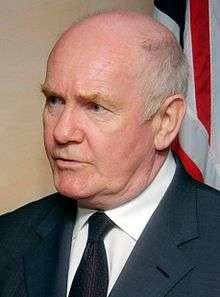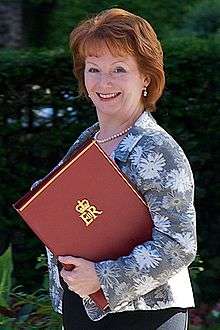Chair of the Labour Party (UK)
The Chair of the Labour Party in the United Kingdom is responsible for party administration, overseeing the general election campaigns of the Labour Party. The role is currently held by Angela Rayner, who is also the Deputy Leader of the party.
| Chair of the Labour Party | |
|---|---|
| Labour Party | |
| Appointer | Leader of the Labour Party |
| Inaugural holder | Charles Clarke |
| Formation | 9 June 2001 |
| Website | Labour Party |
History
The position was created by Tony Blair in the aftermath of the 2001 general election and remained a Cabinet position during the rest of his tenure, holding a sinecure post such as Minister without Portfolio.[1] The position is not to be confused with that of chair of the National Executive Committee, described as "chair of the party" in the Labour Party Constitution. The role had a larger portfolio for organising election campaigning under Jeremy Corbyn, with Ian Lavery working alongside the co-national campaign coordinator, Andrew Gwynne.[1] From 2007 to 2017 and from 2020 onward, the seat was held concurrently by the party's Deputy Leader. The position is currently held by Angela Rayner who was appointed by Keir Starmer following her election as Deputy Leader.
List of Chairs of the Labour Party
| Party chair | Term of office | Leader | |
|---|---|---|---|
.jpg) Charles Clarke |
9 June 2001 | 24 October 2004 | Tony Blair |
 John Reid |
24 October 2002 | 4 April 2003 | Tony Blair |
.jpg) Ian McCartney |
4 April 2003 | 5 May 2006 | Tony Blair |
 Hazel Blears |
5 May 2006 | 24 June 2007 | Tony Blair |
 Harriet Harman |
24 June 2007 | 12 September 2015 | Gordon Brown Herself (acting) Ed Miliband Herself (acting) |
 Tom Watson |
12 September 2015 | 14 June 2017 | Jeremy Corbyn |
 Ian Lavery |
14 June 2017 | 5 April 2020 | Jeremy Corbyn |
 Angela Rayner |
5 April 2020 | Incumbent | Keir Starmer |
References
- Hattersley, Roy (26 July 2001). "Blair mistook his Clarke for a chair". The Guardian. Retrieved 24 May 2007.